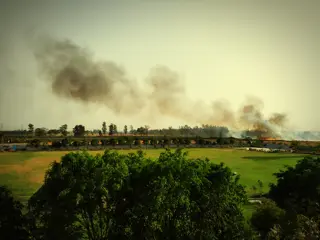Punjab's 25,000-Acre Land Acquisition Plan Sparks Intense Backlash

Scale of the Project
The Punjab government's plan to acquire 24,311 acres of land across 57 villages in Ludhiana, Moga, Ferozepur, and Nawanshahr districts is one of the largest single-phase land acquisitions in India's recent history. This project, equivalent to nearly 100 sectors of Chandigarh, aims to develop urban estates through the Greater Ludhiana Development Authority (GLADA). Targeted villages include Bagga Kalan, Noorpur Bet, and Malakpur, where fertile agricultural land dominates.
Opposition & Concerns
Agricultural and Environmental Fears
- Fertile Land Threatened: Over 2,350 acres of prime agricultural land in villages like Bagga Kalan and Noorpur Bet are slated for acquisition, raising concerns about food security.
- Ecological Pressure: Critics warn that Ludhiana's urban expansion could exacerbate pollution and strain local ecosystems in a region already grappling with industrial overload.
- Lack of Transparency: Farmers and environmentalists allege insufficient consultation and vague details about mitigating agricultural losses, sparking demands for comprehensive impact assessments.
Political Resistance
- Congress and SAD Opposition: The Shiromani Akali Dal (SAD) and Congress have vowed to block the project, threatening protests across Punjab if land acquisition proceeds.
- Farmer Unrest: Villagers argue the acquisition will disproportionately impact livelihoods, with GLADA's land-pooling scheme failing to address equitable compensation.
Government's Justification
Chief Minister Bhagwant Mann defends the plan as 'visionary', emphasizing:
- Employment Generation: Creating industrial zones to address youth unemployment.
- Planned Urbanization: Curbing haphazard development through structured estates.
- Environmental Pledges: Claims development will adhere to sustainability standards, though specific measures remain unclear.
Key Challenges Ahead
- Litigation Risks: Precedents like the Anandgarh project's prolonged legal battles loom large.
- Public Trust Deficit: Farmers distrust government assurances, demanding direct negotiations and compensation terms upfront.
- Balancing Growth and Agriculture: Urban expansion must reconcile Punjab's role as India's breadbasket with infrastructure demands.
Next Steps
The project's fate hinges on:
- Stakeholder Dialogue: GLADA must discuss the future use of land-use concerns with farmers and opposition parties.
- Legal and Environmental Compliance: Clearer public consultations and impact studies required to meet criticism.
- Political Maneuvering: Whether the AAP government can withstand united opposition while maintaining public support.
This contentious plan underscores Punjab's dual identity as an agrarian powerhouse and modernizing economy the outcome will define its future trajectory in both realms.